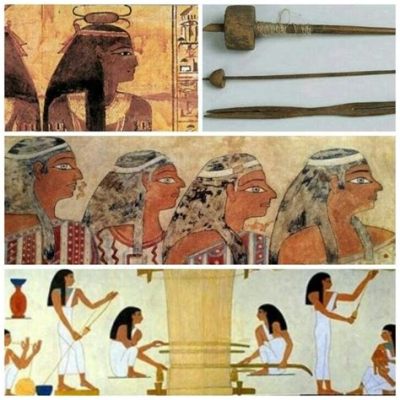The Weaver's Gift: An Egyptian Tale About Gratitude, Deception, and the Unforeseen Consequences of Magic!

In the bustling marketplace of 12th century Cairo, amidst the fragrant spices and vibrant fabrics, lived a humble weaver named Hassan. Renowned for his exquisite tapestries depicting scenes from ancient myths and legends, Hassan was a man of quiet perseverance and profound respect for his craft. He poured his heart and soul into every thread, imbuing each tapestry with a unique vibrancy that captivated all who beheld them.
One scorching summer afternoon, while weaving an intricate pattern depicting the mythical phoenix rising from the ashes, Hassan encountered a withered old woman begging for alms. Moved by her desperate plight, he offered her a small piece of dates and a sip of cool water. The woman, with eyes shimmering like ancient amethysts, looked deep into Hassan’s soul and uttered a prophecy: “Your generosity shall be rewarded, weaver. For within your loom lies the power to grant wishes.”
Bewildered yet intrigued, Hassan initially dismissed her words as ramblings from an addled mind. However, the encounter left a profound impact on him, planting a seed of curiosity in his heart. Weeks later, while struggling with a particularly intricate pattern – the wings of the phoenix seemed perpetually out of reach – he remembered the old woman’s prophecy. Driven by desperation and a glimmer of hope, Hassan muttered a wish under his breath as he wove: “May these threads imbue this tapestry with life.”
To his utter astonishment, the moment he uttered the final word, the tapestry shimmered, and the phoenix began to flap its wings. The mythical bird emerged from the woven fabric, soaring majestically around Hassan’s workshop, its fiery feathers illuminating the dimly lit room.
Overwhelmed with disbelief and awe, Hassan realized the power of the loom and his own unintended mastery over magic. He used this newfound ability to weave wishes into reality for others – restoring sight to the blind, healing the sick, even granting riches to the poor. His fame spread far and wide, drawing crowds from every corner of Egypt seeking solace and fulfillment through Hassan’s magical tapestries.
Yet, as with any great power, there lay a dangerous temptation. One day, a powerful vizier, envious of Hassan’s influence and seeking to control his magic for his own gain, approached the weaver with a cunning proposal. “Weave me a tapestry depicting eternal youth,” he demanded. “Grant me the power to remain forever young and rule this land for generations to come.”
Torn between his desire to help those in need and the potential consequences of such a powerful wish, Hassan hesitated. The vizier, sensing his reluctance, threatened dire consequences should he refuse. Fearful for his own safety, Hassan reluctantly agreed, weaving a tapestry depicting a youthful ruler basking in eternal glory.
The moment the vizier laid eyes on the completed tapestry, a wave of power surged through him, leaving him visibly rejuvenated. But this rejuvenation came at a terrible price. As the vizier reveled in his newfound youth, his heart grew cold and devoid of empathy. He ruled with an iron fist, silencing dissent and plunging Egypt into an era of darkness and oppression.
Hassan, consumed by guilt and horror at the unintended consequences of his act, sought to undo the damage he had wrought. He poured every ounce of his skill and willpower into weaving a tapestry that could counter the vizier’s immortality – a tapestry depicting the relentless march of time and the inevitability of death.
The vizier, initially dismissive of Hassan’s new creation, was soon confronted with a chilling realization: the tapestry depicted not only his own mortality but also his inevitable downfall. Consumed by fear and desperation, he sought to destroy both tapestries, but it was too late. The magic woven into Hassan’s creations had taken on a life of its own.
The vizier aged rapidly, his youthful façade crumbling before his very eyes as he realized the futility of defying time’s inexorable march. Egypt was finally freed from his oppressive rule, and Hassan learned a profound lesson about the responsibility that comes with wielding powerful magic – a lesson woven into the very fabric of his being.
| Theme | Description | Significance |
|---|---|---|
| Gratitude | Hassan’s act of kindness towards the old woman sets in motion the chain of events that leads to him discovering the magical power of his loom. | This highlights the importance of simple acts of generosity and how they can have unforeseen positive consequences. |
| Deception | The vizier’s manipulation and threats showcase the dangers of unchecked ambition and the willingness to exploit others for personal gain. | It underscores the theme that true power comes not from control but from ethical conduct. |
The story of “The Weaver’s Gift” serves as a powerful reminder that magic, like any tool, can be wielded for good or evil. It emphasizes the importance of balancing ambition with empathy and recognizing the far-reaching consequences of our actions, even those seemingly insignificant.
